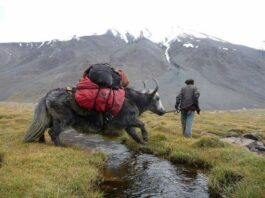“Killing the goose that lays the golden egg” this was the first thing that came into my mind after thinking about the current tourism status of hunza valley. This thought was a bit dramatic influencing me to write a whole article at three am in the morning.
Situated in the north of Pakistan, in Gilgit Baltistan there stood the one of the most mesmerizing places on this planet earth; The Hunza valley. This place is a famous tourist destination due to its stunning natural landscapes, its vibrant culture, and beautiful traditions, while its hospitable locals make this place a haven on earth. This place is an ideal destination for those who want to experience immense culture, adventure and sightseeing.
Recently the tourism in Hunza is own its peak. The massive flow of tourism has for sure impacted the Hunza valley in both positive and negative way; for sure it had a great impact on the economy of the area, providing jobs and a source of income but destroying nature for the sake of tourism is not a sustainable and conservative move instead it’s a short term gain and a long term loss. The increase of tourism has resulted in various environmental and social issues- quite difficult challenges; making the importance of sustainable tourism increasingly apparent. The thought made me shudder that if we continue to non-sustainable tourism the Hunza valley would become a ruin and would have nothing left for our future generations.
But before everything we need to understand what really the sustainable tourism is. The sustainable tourism can be defined as the type of tourism that is economically, socially and environmentally sustainable and preserve able for the future generations. It aims to reduce the impacts on the local communities and environment while maximizing the benefits for both the locals and the tourists. Sustainable tourism is no longer an option but rather a responsibility, the beauty of Hunza, its unique nature and cultural heritage will fade away if we don’t take responsibility for our actions and prioritize sustainability.
The massive and over tourism brings a lot of problems which can be broadly categorized into two main groups; environment challenges and social issues.
The environmental issues that Hunza are no longer invisible; the rapid change in weather and climate in these recent years are really a big threat to the valley in gernal; the destruction of fragile ecosystem, inability to manage massive pollution; increase in the wastage, water shortage and massive energy consumption, deforestation, massive increase in air pollution and visual pollution as well as loss of biodiversity are some of the problems caused by massive tourism.
The social issues caused by the massive tourism starts with the environmental degradation one which we discussed earlier, cultural erosion due to unethical tourism; exploitation of resources since masses need resources like food water and other stuff this might cause a clash between the tourists and locals. Overcrowding is another massive problem due to which a lot of other problems like strain on local infrastructure and heavy traffic can occur. Impacts on the local economy is also a big issue as it can led to dependence on the tourism industry shifting away from the traditional livelihood.
It’s said that understanding a problem is like half solving it; as we understand the problem now what left is to solve this. This problem is quite big and we possibly can’t change anything overnight nor is it something that an individual being can solve. This might seem hard and impossible but we must not forget that where there is a will there is a way. In order to implement sustainable tourism some steps we can take are; promoting ecofriendly practices such as recycling and reducing waste, preserving local culture and traditions, supporting local business and using local products, developing sustainable infrastructure and using the local architect and engaging with the local community and providing guidelines to the tourists.
By following these steps towards sustainable tourism we can possibly achieve and promote ethical and sustainable without providing any damage to the ecosystem or to the local traditions and culture.
So far I hope that you are motivated enough to implement these in your life as for me, I will try my best too. Have a great day~ or night!!!
Article by: Rina


